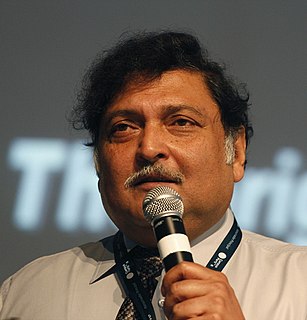A Quote by Amitava Kumar
Does the entry of Indian H-1B worker augur a change in the relations of production in the world of cybertechnology? No, but the presence of such workers - their skills and their histories - introduce contradictions into the system that are not always easily absorbed or dissolved.
Related Quotes
Converting a classic batch-and-queue production system to continuous flow with effective pull by the customer will double labor productivity all the way through the system (for direct, managerial, and technical workers, from raw materials to delivered product) while cutting production throughput times by 90 percent and reducing inventories in the system by 90 percent as well.
Radicals, on the other hand, want to advance from the jungle of laissez-faire capitalism to a world worthy of the name of human civilization. They hope for a future where the means of economic production will be owned by all of the people instead of just a comparative handful. They feel that this minority control of production facilities is injurious to the large masses of people not only because of economic monopolies but because the political power inherent in this form of centralized economy does not augur for an ever expanding democratic way of life.
There is nothing to be known about anything except an initially large, and forever expandable, web of relations to other things. Everything that can serve as a term of relation can be dissolved into another set of relations, and so on for ever. There are, so to speak, relations all the way down, all the way up, and all the way out in every direction: you never reach something which is not just one more nexus of relations.
Changes in society are due chiefly to the development of the internal contradictions in society, that is, the contradiction between the productive forces and the relations of production, the contradiction between classes and the contradiction between the old and the new; it is the development of these contradictions that pushes society forward and gives the impetu6 for the suppression of the old society by the new.
Business requires an unbelievable level of resilience inside you, the chokehold on the growth of your business is always the leader, it's always your psychology and your skills - 80% psychology, 20% skills. If you don't have the marketing skills, if you don't have the financial-intelligence skills, if you don't have the recruiting skills, it's really hard for you to lead somebody else if you don't have fundamentally those skills. And so my life is about teaching those skills and helping people change the psychology so that they live out of what's possible, instead of out of their fear.
Unfortunately, the real minimum wage is always zero, regardless of the laws, and that is the wage that many workers receive in the wake of the creation or escalation of a government-mandated minimum wage, because they lose their jobs or fail to find jobs when they enter the labor force. Making it illegal to pay less than a given amount does not make a worker’s productivity worth that amount—and, if it is not, that worker is unlikely to be employed.
The government must nurture an eco-system where the economy is primed for growth; and growth promotes all-rounddevelopment. Where development is employment-generating ; and employment is enabled by skills. Where skills are synced with production; and production is benchmarked to quality. Where quality meets global standards; and meeting global standards drives prosperity. Most importantly, this prosperity is for the welfare of all. That is my concept ofeconomic good governance and all round development.
I think sex work gets over-mystified and overcomplicated because it's about sexuality, and women's sexuality in general. What strikes me when I look at sex worker organizations and sex worker movements, in the US especially, is that they're so in alignment with other longstanding progressive causes. If anything, sex workers have been at the forefront of some of these causes. There have always been sex workers at the forefront of social movements.






































